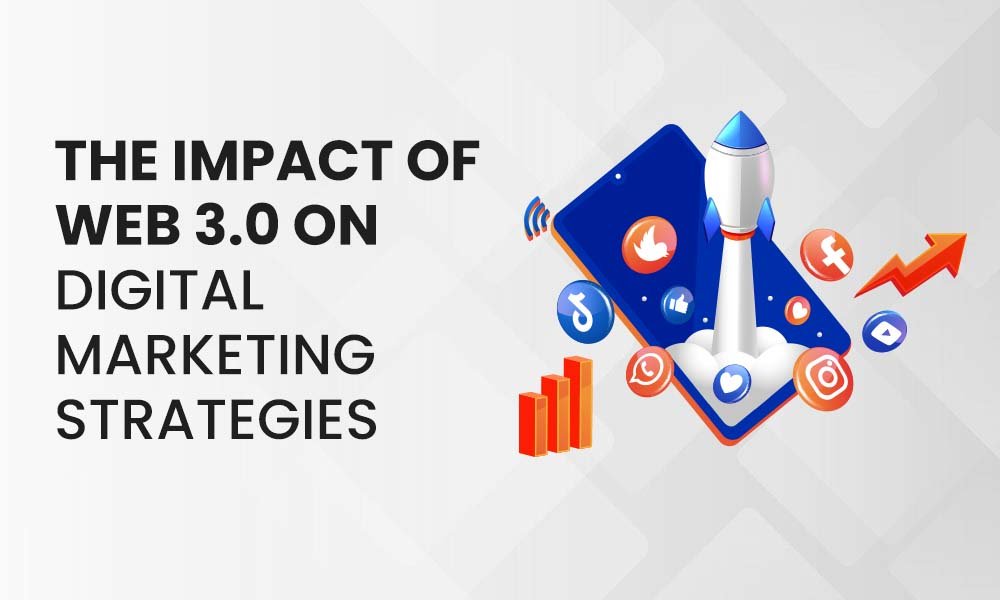
Introduction
The digital landscape is ever-evolving, and with the advent of Web 3.0, we are on the brink of another significant transformation. Web 3.0, often referred to as the semantic web or the decentralized web, promises to revolutionize how we interact online. For digital marketers, understanding and leveraging Web 3.0 technologies is crucial to staying ahead of the curve. This article delves into the profound impact of Web 3.0 on digital marketing strategies, exploring its features, benefits, and the future it holds for marketers.
Understanding Web 3.0
What is Web 3.0?
Web 3.0, also known as the semantic web or decentralized web, represents the next evolution of the internet. Unlike Web 2.0, which is characterized by user-generated content and social media, Web 3.0 focuses on creating a more intelligent, connected, and decentralized web. It aims to enhance data security, user privacy, and personalized experiences by leveraging advanced technologies like blockchain, artificial intelligence, and machine learning.
Evolution from Web 1.0 and Web 2.0
To understand Web 3.0, it’s essential to look at its predecessors:
- Web 1.0: The first iteration of the web, known as the static web, primarily consisted of static pages with limited interactivity. Information flow was one-way, and user engagement was minimal.
- Web 2.0: Marked the era of dynamic and interactive web applications, where user-generated content, social networking, and collaboration became prevalent. Web 2.0 introduced the concepts of sharing, participation, and social media.
- Web 3.0: Builds on the foundations of Web 1.0 and Web 2.0, aiming to create a more intelligent and decentralized web. It focuses on data interoperability, enhanced user privacy, and autonomous interactions powered by AI and blockchain technology.

Key Features of Web 3.0
- Decentralization: Data is stored across a network of computers rather than centralized servers, enhancing security and reducing the risk of data breaches.
- Blockchain Technology: Provides a secure and transparent way to record transactions and manage data, fostering trust and accountability.
- Artificial Intelligence (AI) and Machine Learning (ML): Enable more accurate data analysis, personalized recommendations, and intelligent automation.
- Interoperability: Allows different systems and applications to work together seamlessly, improving user experiences and enabling new use cases.
Impact on Data Security and Privacy
Enhanced Data Security
One of the most significant advantages of Web 3.0 is its enhanced data security. By decentralizing data storage and using blockchain technology, Web 3.0 reduces the risk of data breaches and cyberattacks. This increased security is crucial for digital marketers, as it helps protect sensitive customer information and build trust with users.
User Control Over Personal Data
Web 3.0 empowers users with greater control over their personal data. Through decentralized identities and data ownership, users can decide who can access their information and how it is used. For marketers, this means adopting more transparent and ethical data practices, fostering stronger customer relationships and trust.
Implications for Marketers
The enhanced data security and privacy features of Web 3.0 have significant implications for digital marketers. Marketers will need to adopt new strategies that prioritize user consent and data transparency. Additionally, leveraging blockchain technology for secure data management and smart contracts for transparent advertising practices will become increasingly important.
Core Technologies of Web 3.0
Enhanced Data Security
One of the most significant advantages of Web 3.0 is its enhanced data security. By decentralizing data storage and using blockchain technology, Web 3.0 reduces the risk of data breaches and cyberattacks. This increased security is crucial for digital marketers, as it helps protect sensitive customer information and build trust with users.
User Control Over Personal Data
Web 3.0 empowers users with greater control over their personal data. Through decentralized identities and data ownership, users can decide who can access their information and how it is used. For marketers, this means adopting more transparent and ethical data practices, fostering stronger customer relationships and trust.
Implications for Marketers
The enhanced data security and privacy features of Web 3.0 have significant implications for digital marketers. Marketers will need to adopt new strategies that prioritize user consent and data transparency. Additionally, leveraging blockchain technology for secure data management and smart contracts for transparent advertising practices will become increasingly important.
Decentralization and Its Effects on Marketing
Decentralized Platforms
Decentralized platforms, powered by blockchain technology, are transforming the digital marketing landscape. These platforms offer increased transparency, security, and user control. For marketers, decentralized platforms provide new opportunities to engage with audiences in more authentic and trustworthy ways.
Peer-to-Peer Marketing
Peer-to-peer (P2P) marketing is gaining traction in the Web 3.0 era. P2P marketing leverages decentralized networks to connect directly with consumers, bypassing traditional intermediaries. This approach fosters more genuine interactions and allows marketers to build stronger relationships with their target audience.
Redefining Trust and Transparency
Web 3.0 is redefining trust and transparency in digital marketing. By leveraging blockchain technology, marketers can create verifiable and tamper-proof records of transactions and interactions. This increased transparency helps build trust with consumers, ensuring that marketing practices are ethical and accountable.
Personalized User Experiences
Semantic Web and Personalized Content
The semantic web, a core component of Web 3.0, enables more personalized and context-aware content delivery. By understanding the meaning of data and user intent, marketers can create highly relevant and engaging content that resonates with individual users.
Advanced Data Analytics
Web 3.0 technologies, such as AI and ML, enable advanced data analytics that provide deeper insights into customer behavior. Marketers can leverage these insights to create more targeted and effective marketing campaigns, improving engagement and conversion rates.
Real-time Customization
Real-time customization is another key benefit of Web 3.0. By leveraging AI and ML, marketers can deliver personalized experiences in real-time, adjusting content and offers based on user interactions and preferences. This level of customization enhances user satisfaction and drives higher engagement.
Content Creation and Distribution in Web 3.0
User-Generated Content
Web 3.0 encourages user-generated content (UGC), allowing users to contribute and share their own content across decentralized platforms. Marketers can leverage UGC to enhance brand authenticity and engage with their audience in more meaningful ways.
Content Authenticity and Verification
Blockchain technology enables the verification of content authenticity, ensuring that information is accurate and reliable. This is particularly important in an era where misinformation and fake news are prevalent. For marketers, verified content builds trust with consumers and enhances brand credibility.
Decentralized Content Platforms
Decentralized content platforms offer new opportunities for content creation and distribution. These platforms, powered by blockchain, provide greater transparency and control over content ownership and monetization. Marketers can use these platforms to reach wider audiences and create more impactful content strategies.

Advertising in the Web 3.0 Era
Targeted Advertising with AI
AI-driven advertising is a cornerstone of Web 3.0. By leveraging AI, marketers can deliver highly targeted and relevant ads to users, improving engagement and conversion rates. AI also enables real-time ad optimization, ensuring maximum impact and efficiency.
User Consent and Ethical Advertising
Web 3.0 places a strong emphasis on user consent and ethical advertising. Marketers must adopt transparent data practices and obtain explicit consent from users before collecting and using their data. This approach not only complies with regulations but also builds trust with consumers.
Reduced Ad Fraud
Blockchain technology helps reduce ad fraud by providing a transparent and verifiable record of ad transactions. Marketers can use blockchain to ensure that their ads are being viewed by real users and that advertising budgets are being spent effectively.
SEO and Web 3.0
Semantic Search and SEO
Semantic search is a key feature of Web 3.0, enabling search engines to understand the context and intent behind user queries. For marketers, optimizing content for semantic search is crucial to improve visibility and rankings. This involves using structured data and creating content that aligns with user intent.
Importance of Structured Data
Structured data plays a vital role in Web 3.0 SEO. By providing search engines with detailed and organized information, marketers can enhance their content’s visibility and relevance. Implementing structured data helps search engines better understand and categorize content, leading to improved rankings.
Voice Search Optimization
Voice search is becoming increasingly prevalent in the Web 3.0 era. Marketers must optimize their content for voice search by focusing on natural language and conversational queries. This involves creating content that answers common questions and provides clear, concise information.
Social Media Transformation
Decentralized Social Networks
Decentralized social networks, powered by blockchain, are emerging as alternatives to traditional platforms. These networks offer greater privacy and control for users, reducing the influence of centralized entities. Marketers can leverage decentralized social networks to engage with audiences in more transparent and authentic ways.
Enhanced User Privacy
Web 3.0 places a strong emphasis on user privacy. Decentralized social networks and blockchain technology provide users with greater control over their data, enhancing privacy and security. Marketers must adapt to these changes by prioritizing user consent and transparent data practices.
New Engagement Metrics
The shift to decentralized social networks brings new engagement metrics for marketers to consider. These metrics focus on authentic interactions and user trust, rather than traditional vanity metrics. By understanding and leveraging these new metrics, marketers can create more meaningful and impactful social media strategies.
Challenges and Opportunities for Marketers
Adapting to New Technologies
The transition to Web 3.0 presents both challenges and opportunities for digital marketers. Adapting to new technologies, such as blockchain and AI, requires significant investment and expertise. However, those who successfully navigate this transition can gain a competitive edge and create more effective marketing strategies.
Overcoming Privacy Concerns
Privacy concerns are a significant challenge in the Web 3.0 era. Marketers must adopt transparent data practices and prioritize user consent to build trust with consumers. By addressing privacy concerns proactively, marketers can enhance their brand reputation and foster stronger customer relationships.
Leveraging Opportunities
Web 3.0 offers numerous opportunities for digital marketers, from enhanced data security to personalized user experiences. By leveraging these opportunities, marketers can create more engaging and impactful campaigns that resonate with their target audience. Embracing Web 3.0 technologies and strategies is essential to staying ahead in the ever-evolving digital landscape.

Case Studies of Web 3.0 in Digital Marketing
Successful Web 3.0 Marketing Campaigns
Several brands have successfully leveraged Web 3.0 technologies in their marketing campaigns. For example, brands have used blockchain for transparent supply chain tracking, AI for personalized recommendations, and decentralized platforms for authentic user engagement. These case studies demonstrate the potential of Web 3.0 to revolutionize digital marketing.
Lessons Learned
From these successful campaigns, marketers can learn valuable lessons about leveraging Web 3.0 technologies. Key takeaways include the importance of transparency, user consent, and personalized experiences. By understanding these lessons, marketers can create more effective and ethical marketing strategies.
Best Practices
To succeed in the Web 3.0 era, marketers should follow best practices such as adopting transparent data practices, leveraging AI for personalized experiences, and using blockchain for secure data management. By implementing these best practices, marketers can navigate the complexities of Web 3.0 and create impactful marketing campaigns.
Future Trends and Predictions
Emerging Trends in Web 3.0
Emerging trends in Web 3.0 include the rise of decentralized finance (DeFi), increased adoption of blockchain technology, and advancements in AI and ML. These trends are shaping the future of digital marketing, offering new opportunities and challenges for marketers to consider.
Predictions for the Next Decade
Over the next decade, Web 3.0 is expected to become more mainstream, with widespread adoption of decentralized technologies and AI-driven marketing. Marketers will need to stay ahead of these trends by continually adapting their strategies and embracing new technologies.
Preparing for the Future
To prepare for the future of Web 3.0, marketers should invest in ongoing education and training, stay informed about emerging trends, and experiment with new technologies. By staying proactive and adaptable, marketers can thrive in the evolving digital landscape and create impactful marketing strategies.
Conclusion
In conclusion, Web 3.0 represents a significant shift in the digital landscape, offering enhanced data security, personalized experiences, and decentralized platforms. For digital marketers, understanding and leveraging Web 3.0 technologies is crucial to staying ahead of the curve. By adopting transparent data practices, leveraging AI and blockchain, and creating personalized content, marketers can create impactful and ethical marketing strategies that resonate with their audience.
